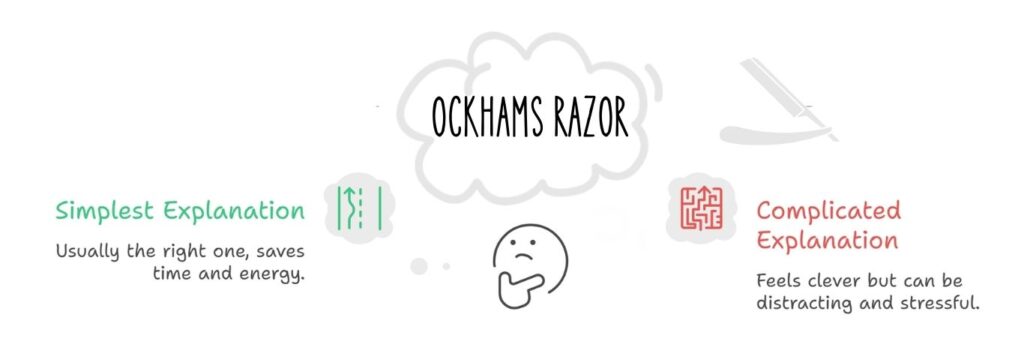Win at Life


Ockham’s Razor
What it is – and why it matters
In the 14th century, William of Ockham, a Franciscan friar (and by some accounts a professor of philosophy), suggested something almost irritatingly sensible: the simplest explanation is usually the right one.
Not because life is simple, but because the extra twists we add are often the problem. Our brains adore complexity. We love to play detective, spinning suspicion and mini-paranoias in our heads, CSI-style, when the answer is usually staring us in the face. If it quacks like a duck, it is unlikely to be a parakeet.
The truth is, complicated stories can feel clever. They give us somewhere to put our anxiety, or make us feel like we are being thorough. But more often than not, all that theorising is just messy, distracting clutter. Ockham’s Razor slices through it, helping us get back to what is likely, obvious, and useful.
When you reach for the simplest explanation, you do not just save yourself stress. You save time, energy, and sidestep the drama that comes with overthinking.
It is the difference between having a nightmare day and a good one.
Real-life examples
What if your client didn’t reply because they were busy rather than secretly plotting a takeover, setting up a rival company, or drafting a 12-page complaint?
Or the ache is probably not some rare tropical disease from your recent holiday. You probably just need a decent night’s sleep.
Perhaps your bank account is not haemorrhaging funds because of a cyber scam. You just forgot that three direct debits were due on the same day.
Try this today
When you catch yourself spinning up a complicated theory, stop and ask: what is the plainest, most boring explanation?
You do not have to dismiss the more dramatic ones completely, but start with the obvious before you build a Hollywood script around it.
Some things to think about
- Do you sometimes confuse complicated with impressive?
- Where might the simpler explanation save you energy rather than create more drama?
- How often do you add detail to look thorough, when clarity would serve you better?
Optional challenge
For the next seven days, notice when you get caught up in overly complex reasoning.
Write down your first, simple thought before the rest of your brain adds layers. Keep a little log of these.
By the end of the week, you will have proof of how often the plain answer was correct.
A Buddh-ish take
“Do not add where nothing is lacking.” – Dhammapada
Clarity does not always mean more data, more detail, or more digging. It often means letting go of the extras and trusting that the simplest version is enough.
Back to Mindset Mechanics <
Back to The Vault <
References
- William of Ockham. Summa Logicae (c.1323).
- Stanford Encyclopedia of Philosophy (2020). “William of Ockham.” Retrieved from https://plato.stanford.edu/entries/ockham/
- Thorburn, W.M. (1918). “The Myth of Ockham’s Razor.” Mind, 27(107), 345–353.
- Sober, E. (1981). “The Principle of Parsimony.” British Journal for the Philosophy of Science, 32(2), 145–156.

